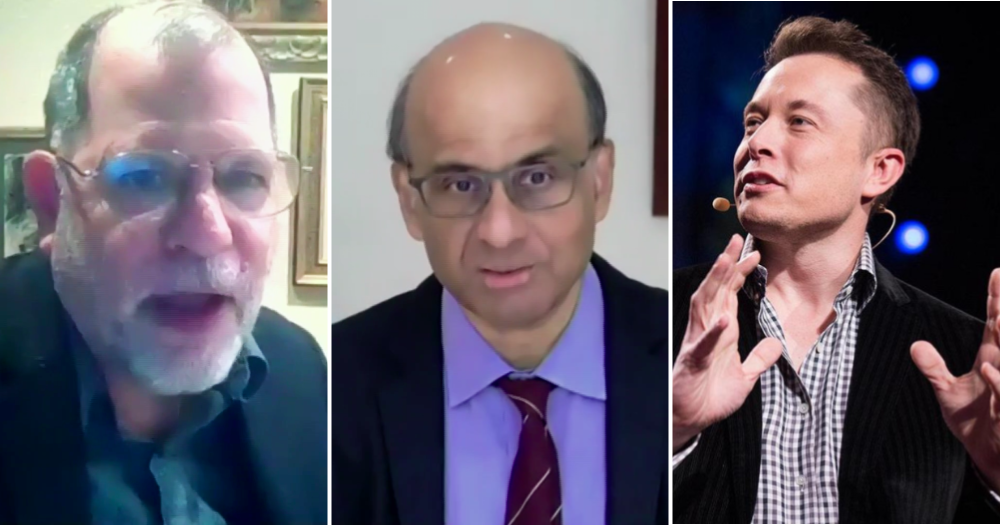Lifelong learning, Singapore's progressive wage model, and the future of working from home were some of the topics discussed at a forum on "Jobs and Skills", at this year's edition of the Institute of Policy Studies (IPS) annual forum, Singapore Perspectives.
Oh, and Elon Musk.
The South African-born entrepreneur — and newly-minted richest man on earth — was mentioned in discussions on entrepreneurship in Singapore, and on the role of local companies in creating jobs for Singaporeans.
Where will future jobs come from?
What is the future of the sources of job creation? Asked moderator Danny Quah, the Dean of the Lee Kuan Yew School of Public Policy (LKYSPP) and the Li Ka Shing Professor in Economics.
Senior Minister Tharman Shanmugaratnam, who is Coordinating Minister for Social Policies and also heads the National Jobs Council, suggested that a "complement of local and foreign" companies would be needed for the future of the economy and job creation.
He observed that Singapore had previously adopted a strategy that relied on multinational companies (MNCs), which had worked well.
He added, however, that "our local companies are coming into their own as innovators, and as leaders in Asia," saying that a "solid core of local companies" was needed to create good jobs.
Selena Ling, the Chief Economist in the Global Treasury Division of OCBC Bank echoed these sentiments, saying that the earlier strategy which emphasised foreign investments and MNCs had evolved, and that there are now SMEs here that are "on par with some of their regional peers".
Ensuring the "broad middle in society in doing well"
Tharman also tackled the question from the perspective of ensuring that there was "a moving escalator that takes everyone up".
He made reference to a point that Tyler Cowen, the Holbert L. Harris Chair of Economics at The Center for Study of Public Choice in George Mason University — also a speaker at the forum — brought up about the recent events in Washington DC, where Trump supporters stormed the Capitol Building.
Tharman said that those involved "were not poor people", and were likely to be "somewhere in the broad middle" which had not seen much uplift in their standard of living.
He warned that if the middle class was allowed to stagnate, people would get "very anxious about relative positions".
Thus, he explained, Singapore's economic strategies — including those targeting entrepreneurship — should be geared "to ensure that the broad middle in society is doing well."
Will Singapore see its own Elon Musks and Mark Zuckerbergs?
The forum also spoke on the topic of what could be done to encourage entrepreneurship, which would then help to ensure that good and productive jobs are created.
Specific to entrepreneurship, Quah asked, "what can Singapore do to bring about, to encourage the Elon Musks and Mark Zuckerbergs of the world?"
Cowen expressed what he admitted was a "a very contrarian opinion" — that Singapore was "one of the most entrepreneurial places in the world".
He said, however, that entrepreneurship takes on a different form in Singapore, highlighting features like predictability, rule of law, and the quality of governance here, as being "extraordinarily entrepreneurial".
He was skeptical about Singapore producing an Elon Musk, however.
"I don't think you'll ever have an Elon Musk. He's not your style, right?"
Cowen pointed to the fact that the billionaire entrepreneur's free-wheeling social media persona might not be acceptable in a "Singaporean society" which he described as being "in some ways too conformist".
However, Ling countered that there currently no lack of local entrepreneurship, and expressed optimism in "potential unicorns to come", and in Singapore's prospects for a future Elon Musk, saying:
"Maybe we don’t have a Elon Musk at this juncture, but hopefully all the money pouring into [Research and development (R&D)] will pay off in decade or two."
Mindsets on older workers need to change
The forum also covered the topic of older workers in the economy.
Tharman said that older workers made up a disproportionately large number of those with the lowest-wages here.
This was further exacerbated by the fact that median incomes have grown by 65 per cent in the last two decades, making inequality more pronounced.
Tharman said that Singapore's intended approach to this was "a calibrated minimum wage plus model, together with Workfare, and together with economic strategies" — an approach which he outlined comprehensively in his address.
This, he explained, would help to secure dignity for older workers in terms of being able to contribute through their work, and by earning better wages, to ensure "not just a minimum wage, but maximum employment".
Quah posed a question on what could be done to ensure that older workers and those with disabilities, among other vulnerable groups in the workforce (which Quah referred to generally as "persons with stereotypes racked against them") were included in the workforce.
In response, Ling put the spotlight on employers' mindsets (including ageist mindsets) needing to change.
She explained that government messaging was also important, to reinforce to employers that existing foreign worker policies would stay, forcing employers to "maximise and utilise all the different segments of the Singapore workforce the local workforce."
Tharman had also mentioned earlier in the discussion that hiring older employees was "not just about skills mismatch".
Rather, he said, it was about "willingness to be able to hire and reskill and upskill someone who already has significant skills."
After all, Tharman said, the norm in labour markets was for employers to "hire someone, and train them up".
Top image via IPS livestream and Zaranika Tanefi / FB
If you like what you read, follow us on Facebook, Instagram, Twitter and Telegram to get the latest updates.
